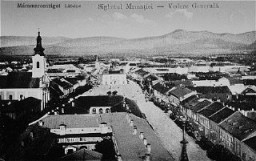You searched for: google优化内链【TG飞机:@bapingseo】谷歌排名算法视频【TG电报:@bapingseo】深圳谷歌seo【Telegram:@bapingseo】2022世界杯投注公司mgm苹果下载?1qQbtU/736357.html
<< Previous | Displaying results 601-625 of 672 for "google优化内链【TG飞机:@bapingseo】谷歌排名算法视频【TG电报:@bapingseo】深圳谷歌seo【Telegram:@bapingseo】2022世界杯投注公司mgm苹果下载?1qQbtU/736357.html" | Next >>
-
Genocide of European Roma (Gypsies), 1939–1945
ArticleLearn about the history of discrimination against Roma in Europe and how the Nazi regime committed genocide against European Roma during WWII.
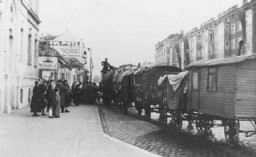
-
The Security Police (SiPo)
ArticleThe Security Police (Sicherheitspolizei, SiPo) was a German police organization created by Heinrich Himmler. Learn about its origin and role in the Holocaust.
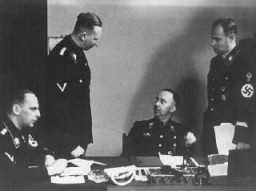
-
Siegfried Halbreich describes arrival at and conditions in the Sachsenhausen camp
Oral HistoryAfter Germany invaded Poland on September 1, 1939, Siegfried fled with a friend. They attempted to get papers allowing them to go to France, but were turned over to the Germans. Siegfried was jailed, taken to Berlin, and then transported to the Sachsenhausen camp near Berlin in October 1939. He was among the first Polish Jews imprisoned in Sachsenhausen. Inmates were mistreated and made to carry out forced labor. After two years, Siegfried was deported to the Gross-Rosen concentration camp, where he was…
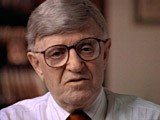
-
Siegfried Halbreich describes treatment of prisoners in the Sachsenhausen camp
Oral HistoryAfter Germany invaded Poland on September 1, 1939, Siegfried fled with a friend. They attempted to get papers allowing them to go to France, but were turned over to the Germans. Siegfried was jailed, taken to Berlin, and then transported to the Sachsenhausen camp near Berlin in October 1939. He was among the first Polish Jews imprisoned in Sachsenhausen. Inmates were mistreated and made to carry out forced labor. After two years, Siegfried was deported to the Gross-Rosen concentration camp, where he was…
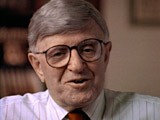
-
Charlene Schiff describes her liberation by Soviet troops
Oral HistoryBoth of Charlene's parents were local Jewish community leaders, and the family was active in community life. Charlene's father was a professor of philosophy at the State University of Lvov. World War II began with the German invasion of Poland on September 1, 1939. Charlene's town was in the part of eastern Poland occupied by the Soviet Union under the German-Soviet Pact of August 1939. Under the Soviet occupation, the family remained in its home and Charlene's father continued to teach. The Germans…
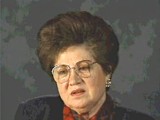
-
Felix Horn describes postwar emigration with the Brihah movement and adjustment to life after the war
Oral HistoryFelix was born to an assimilated Jewish family in Lublin, Poland. His father was a locksmith and his mother was a singer. Following the German invasion of Poland on September 1, 1939, Felix fled east to Rovno and then to Soviet-occupied Lvov, where he was accepted at a medical school. After the German invasion of the Soviet Union in June 1941, Felix was taken to a labor camp. He escaped and returned to Lublin, and found that his family had been forced into the ghetto established there. After the…
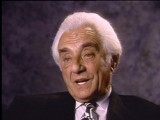
-
Lucine Horn describes obtaining false papers to assume the identity of an "Aryan" outside the Warsaw ghetto
Oral HistoryLucine was born to a Jewish family in Lublin. Her father was a court interpreter and her mother was a dentist. War began with the German invasion of Poland on September 1, 1939. Lucine's home was raided by German forces shortly thereafter. Soon after the German occupation of Lublin, Jews there were forced to wear a compulsory badge identifying them as Jews. A ghetto in Lublin was closed off in January 1942. Lucine survived a series of killing campaigns and deportations from the ghetto during March and…
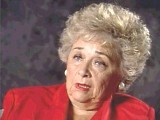
-
Felix Horn describes attempt to flee from the Majdan Tatarski ghetto
Oral HistoryFelix was born to an assimilated Jewish family in Lublin, Poland. His father was a locksmith and his mother was a singer. Following the German invasion of Poland on September 1, 1939, Felix fled east to Rovno and then to Soviet-occupied Lvov, where he was accepted at a medical school. After the German invasion of the Soviet Union in June 1941, Felix was taken to a labor camp. He escaped and returned to Lublin, and found that his family had been forced into the ghetto established there. After the…
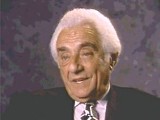
-
Felix Horn describes antisemitism in Lvov and conditions in the Janowska camp
Oral HistoryFelix was born to an assimilated Jewish family in Lublin, Poland. His father was a locksmith and his mother was a singer. Following the German invasion of Poland on September 1, 1939, Felix fled east to Rovno and then to Soviet-occupied Lvov, where he was accepted at a medical school. After the German invasion of the Soviet Union in June 1941, Felix was taken to a labor camp. He escaped and returned to Lublin, and found that his family had been forced into the ghetto established there. After the…
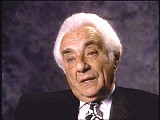
-
Lucine Horn describes conditions in the Lublin ghetto
Oral HistoryLucine was born to a Jewish family in Lublin. Her father was a court interpreter and her mother was a dentist. War began with the German invasion of Poland on September 1, 1939. Lucine's home was raided by German forces shortly thereafter. Soon after the German occupation of Lublin, Jews there were forced to wear a compulsory badge identifying them as Jews. A ghetto in Lublin was closed off in January 1942. Lucine survived a series of killing campaigns and deportations from the ghetto during March and…
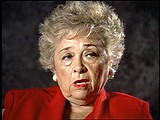
-
Ludmilla Page describes conditions in Oskar Schindler's munitions factory in Brünnlitz
Oral HistoryLudmilla was born to an assimilated Jewish family in Kishinev, Romania. She and her mother, a physician, were living in Poland when the Germans invaded on September 1, 1939. They were taken to Krakow. Ludmilla was forced to live in the Krakow ghetto; her mother was sent to the Warsaw ghetto. Ludmilla worked in a factory at the Plaszow labor camp for a businessman who was a friend of the German industrialist Oskar Schindler. In October 1944, Schindler attempted to save some Jewish workers by relocating them…
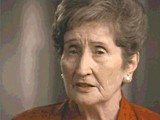
-
Charlene Schiff describes a clandestine school for children in the Horochow ghetto
Oral HistoryBoth of Charlene's parents were local Jewish community leaders, and the family was active in community life. Charlene's father was a professor of philosophy at the State University of Lvov. World War II began with the German invasion of Poland on September 1, 1939. Charlene's town was in the part of eastern Poland occupied by the Soviet Union under the German-Soviet Pact of August 1939. Under the Soviet occupation, the family remained in its home and Charlene's father continued to teach. The Germans…
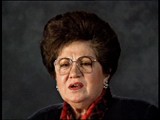
-
Charlene Schiff describes the German invasion of her town, Horochow, in the summer of 1941
Oral HistoryBoth of Charlene's parents were local Jewish community leaders, and the family was active in community life. Charlene's father was a professor of philosophy at the State University of Lvov. World War II began with the German invasion of Poland on September 1, 1939. Charlene's town was in the part of eastern Poland occupied by the Soviet Union under the German-Soviet Pact of August 1939. Under the Soviet occupation, the family remained in its home and Charlene's father continued to teach. The Germans…
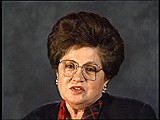
-
Charlene Schiff describes foraging for food in order to survive in forests after escaping from the Horochow ghetto
Oral HistoryBoth of Charlene's parents were local Jewish community leaders, and the family was active in community life. Charlene's father was a professor of philosophy at the State University of Lvov. World War II began with the German invasion of Poland on September 1, 1939. Charlene's town was in the part of eastern Poland occupied by the Soviet Union under the German-Soviet Pact of August 1939. Under the Soviet occupation, the family remained in its home and Charlene's father continued to teach. The Germans…
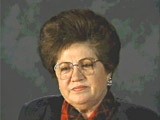
-
Siegfried Halbreich describes conditions and forced labor in the Gross-Rosen camp
Oral HistoryAfter Germany invaded Poland on September 1, 1939, Siegfried fled with a friend. They attempted to get papers allowing them to go to France, but were turned over to the Germans. Siegfried was jailed, taken to Berlin, and then transported to the Sachsenhausen camp near Berlin in October 1939. He was among the first Polish Jews imprisoned in Sachsenhausen. Inmates were mistreated and made to carry out forced labor. After two years, Siegfried was deported to the Gross-Rosen concentration camp, where he was…
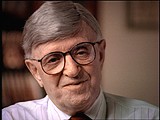
-
Flight and Rescue
ArticleExplore the story of over 2,000 Polish Jewish refugees who fled east to escape war-torn Europe. They sought safety in such distant places as China and Japan.
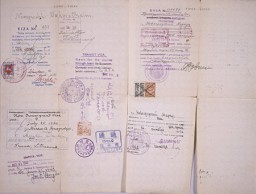
-
Writing the News
ArticleShortly after taking power in January 1933, Adolf Hitler and the Nazis took control of German newspapers, detailing how the news was to be reported.
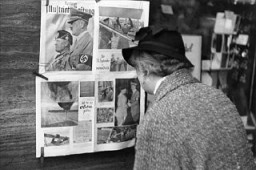
-
Euthanasia Program and Aktion T4
ArticleThe Nazi Euthanasia Program, codenamed Aktion "T4," was the systematic murder of institutionalized people with disabilities. Read about Nazi “euthanasia.”
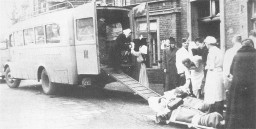
-
Incitement to Genocide in International Law
ArticleAfter the Holocaust, the IMT charged the first case of “incitement to genocide.” Learn more about the crime and its application in modern genocide law.
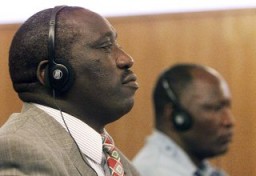
-
1943: Key Dates
ArticleExplore a timeline of key events during 1943 in the history of Nazi Germany, World War II, and the Holocaust.
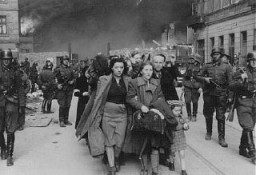
-
Uckermark Youth Camp
ArticleThe Uckermark camp was one of the so-called youth protection camps that the Nazi regime established for young people who were alleged to have strayed from Nazi norms and ideals.
-
The Order Police
ArticleThe Order Police (Ordnungspolizei, Orpo) were Nazi Germany’s uniformed police forces. They became perpetrators of horrific crimes and played a significant role in the Holocaust.
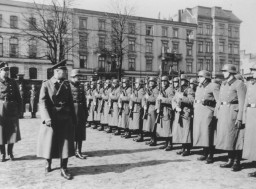
-
Lackenbach (Roma internment and transit camp)
ArticleThe Lackenbach internment and transit camp for Roma, located in what had been eastern Austria, was a departure point for deportations to Lodz and Auschwitz.
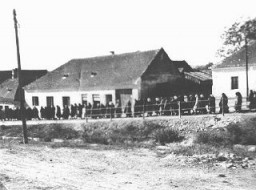
-
Charles E. Coughlin
ArticleCharles Coughlin, Catholic priest and populist leader, promoted antisemitic and pro-fascist views. In the 1930s, he was one of the most influential public figures in the US.
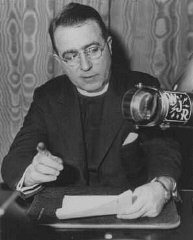
-
Sighet
ArticleLearn about the history of Sighet, birthplace of Elie Wiesel. The Jewish population of Sighet was deported to Auschwitz in May 1944. Most of the deportees were gassed on arrival.
